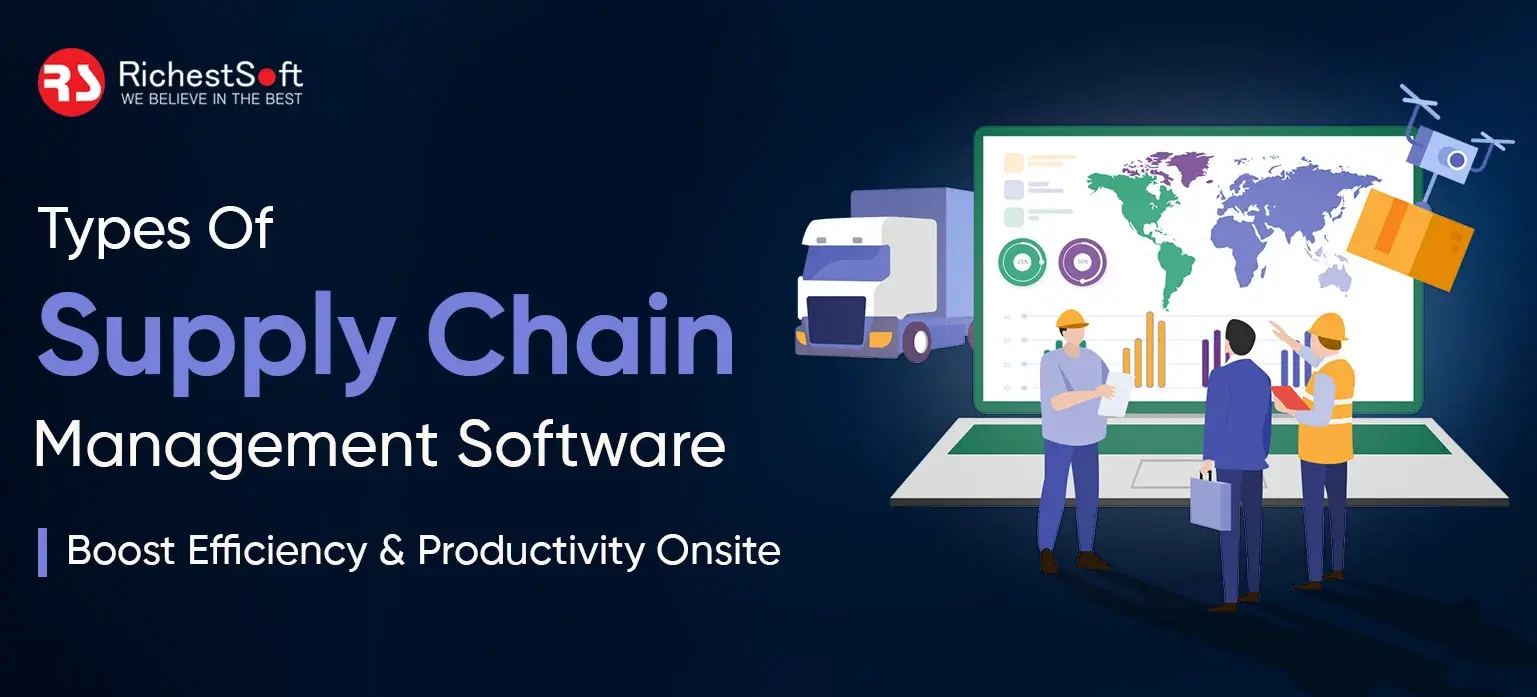December 12, 2024
An effective supply chain is the lifeblood of any robust business today. It undeniably ensures a smooth flow of goods. Traditional supply chains, which are hugely dependent on human resources, are slow, time-consuming, and error-prone. However, the advancement of software development plays an essential role in supply chain management (SCM) today, ensuring the seamless movement of products from manufacturing to distribution.
With the right supply chain software development services from a reputable development company, businesses can perform various tasks faster and store data digitally that is easy to access and process. Such software solutions are rapidly increasing in your business’s supply chain management. However, choosing any particular type of supply chain management can be quite complicated.
In this post, we have discussed the supply chain management software types with some existing supply chain management software. Keep reading!

Types Of Supply Chain Management Software
Let’s begin with the understanding of types of supply chain management software:
- Inventory Management Software
Inventory management systems help businesses control and optimize their inventory by tracking stock in real-time, automating orders, and forecasting demand. With IMS, businesses can easily monitor incoming and outgoing goods, maintain the right stock levels, and avoid bottlenecks. For supply chain companies, inventory management software optimizes warehouse space, simplifies production planning, and predicts demand to prevent under-stocks.
Additionally, warehouse management tools powered by custom AI development can group products to simplify logistics. For instance, businesses can bundle shipments that need to leave around the same time, making it easier to retrieve them.
- Warehouse Management Softwares
Warehouses that store, package, and ship goods use WMS to trace their stock. This warehouse management software helps businesses analyze the exact information of how much inventory they have, where it’s located, and how it’s moving in and out of the warehouse. Businesses can also use WMS to organize and streamline tasks like storing, picking, packing, and shipping items. This minimizes the inefficiencies and cuts down on waste.
Many of these programs also include tools for managing labor, allocating resources, and generating reports. These features help businesses better use their workforce, ensure resources are used effectively, and keep track of essential data for decision-making.
- Transportation Management Software
The shipment of goods and materials is an integral stage of the supply chain, and transportation management software (TMS) helps to optimize every step of the process. Businesses can invest in the development of TMS to determine the ideal carrier to transport goods based on cost, transit times, reliability, and capacity.
This software also helps to optimize shipping routes for faster and more cost-effective delivery. Another essential feature of this software is shipment tracking, which allows access to real-time visibility into the status of shipments.
- Supplier Relation Management Software
Supplier relationship management (SRM) software enhances interaction among business suppliers. It enables businesses to consolidate supplier data, record contract terms and conditions, automate purchase orders, evaluate supplier performance, and execute other essential functions.
Multiple SRM software has built-in communication platforms via AI chatbot solutions that help businesses and suppliers share messages and information documents. Small—and medium-sized companies can often use enterprise resource planning (ERP) systems for supplier management. Still, large businesses require a separate SRM platform to coordinate supplier relationships.
- Demand Planning Software
Demand planning software is excellent at forecasting! DPS predicts customer demand using past sales data, algorithms incorporating buying trends, and input from various stakeholders. Businesses use demand planning software to optimize inventory levels, align production schedules with estimated demands, reduce storage costs, and anticipate market fluctuations.
- Enterprise Resource Planning Software
Enterprise resource planning, in other words, ERP software powered by RPA development integrates inventory management, human resources, customer financial planning, relationship management, and other business functions into one centralized system.
It facilitates the detailed overview of an organization’s process, enabling users to gather real-time data and make data-informed decisions. However, in terms of supply chain operations, ERP systems help businesses streamline production planning, procurement, manufacturing, stock control, and warehouse management.
Tips To Get The Right Supply Chain Management Software
While we move ahead, it is essential to understand how you can choose the right supply chain management software. This must be a careful step based on the business’s needs and requirements. Here are some of the tips for choosing the right supply chain management software:
- Assessing Business Size
One of the foundational considerations when selecting SCM software is analyzing the overall size of your business. Whether you operate a small, mid-sized, or large organization, the scalability and features of the supply chain management software must align with the scale of your operations.
A system that is too big for a small business may lead to unnecessary complexity, while insufficient and small software for a larger enterprise could result in operational bottlenecks.
- Understanding Your Products or Services
The nature of the business’s services or product is essential to the right SCM software. Different industries have distinct supply chain requirements, and a customized solution can optimize processes.
For instance, businesses dealing with perishable goods may require real-time tracking and temperature control features, while those in the manufacturing sector might prioritize inventory management and production planning capabilities.
- Making An Overview Of Budget
Your budget is undeniably a practical constraint that shapes the available options. While investing in robust supply chain management software, finding a balance that aligns with your financial resources is crucial. Consider upfront and ongoing expenses, including maintenance, training, and potential scalability expenses. A well-aligned budget ensures you get the most value from your SCM investment.
- Integration with Existing IT Infrastructure
The new supply chain management software must integrate well with your current IT setup for a smooth transition and ongoing operations. With the help of any top-rated logistic software development company, businesses can analyze how the SCM software will work with your existing systems, databases, and applications. Good compatibility ensures accurate data, fewer errors, and better system performance.
- Considering Supply Chain Complexity
Supply chain complexity is a key determinant in making decision to choose supply chain management software. Businesses with intricate supply chains involving distribution channels, multiple suppliers, and international logistics advanced features such as real-time visibility, demand forecasting, and risk management supply chain software tools. Analyze whether the supply chain management solution can adapt to your supply chain for optimal performance.
List Of Supply Chain Management Software
While in case you have made your mind to invest in supply chain management software. Here is a list of supply chain softwares. Explore the below-mentioned list:
- SAP
SAP delivers a comprehensive supply chain management solution, offering real-time data and automation to streamline processes. It helps companies improve visibility, reduce operational costs, and plan smooth demand. SAP’s scalability makes it effective for businesses of all sizes across multiple industries.
- NetSuite
NetSuite offers cloud-based supply chain management that integrates seamlessly with financials and CRM. It enables businesses to optimize inventory, enhance collaboration, and automate their supply chain processes. Its user-friendly interface simplifies complex supply chain operations for growing enterprises.
- Epicor
Epicor provides robust tools to manage supply chains across industries. Its software lets companies control logistics, monitor suppliers, and ensure timely deliveries with precise inventory management. Epicor’s flexible deployment options allow businesses to tailor the software to meet specific supply chain requirements.
- Precoro
Precoro simplifies procurement and supply chain workflows by offering purchase order automation and spend management features. It helps businesses save time, minimize costs, and improve overall efficiency. Precoro’s reporting tools also give users full transparency into procurement activities.
- Netstock
Using intelligent forecasting and automated stock replenishment, Netstock helps businesses optimize inventory management. It enables companies to reduce stockouts, lower excess inventory, and increase profitability. Netstock’s cloud-based solutions enable businesses to get a full-cycle software development solution that is responsive and profitable. Each solution integrates with leading ERP systems for improved inventory accuracy.
Supply Management Software Impact On Business Process
As technology advances, more businesses adopt digital solutions to stay competitive in the global market. This is essentially true in supply chain management, where one of the primary benefits of the supply chain management software is improved visibility.
Using this software, businesses can track inventory, view predictions about customer demand, detect delays, and monitor the status of shipments or interruptions with just a mouse click. Digital solutions can also improve internal communication and cross-company collaboration, enabling stakeholders to share information and work cooperatively on strategic initiatives instantly.
Additionally, many businesses make use of supply chain software to automate recurring tasks such as shipment tracking, order processing, and inventory management, resulting in cost savings and increased productivity. In a complex supply chain world, software programs and other technologies are indispensable tools for enhancing operational efficiency and achieving organizational objectives.
Hire RichestSoft To Get Scalable Supply Chain Management Software
In case you are confused about which type of supply chain management software to invest in, the best decision is to hire a reputable supply chain management software development company like RichestSoft.
RichestSoft stands out as the ideal partner for developing scalable supply chain management software. With years of expertise crafting cutting-edge solutions, RichestSoft ensures businesses can streamline their operations with fully customized, efficient, and scalable platforms.
Our software integrates seamlessly across various systems, enhancing visibility, collaboration, and efficiency throughout the supply chain. Whether tracking logistics, managing inventory, or analyzing data in real-time, RichestSoft’s high-end solutions are designed to grow with your business, ensuring flexibility and scalability as your objectives increase.
Conclusion
Supply chain software tool is an iconic approach for all types and size of businesses. It enables them to streamline operations, enhance visibility, and make informed decisions across the supply chain network.
However, remember that by choosing the right supply chain management software, businesses can increase efficiency, reduce costs, and improve user satisfaction, ultimately leading to business growth and success. Partnering with a reputable supply chain management software development company ensures seamless integration and customization of these software solutions, customizing them to your business’s unique requirements and goals.

 +1 315 210 4488
+1 315 210 4488 +91 99888 06489
+91 99888 06489







